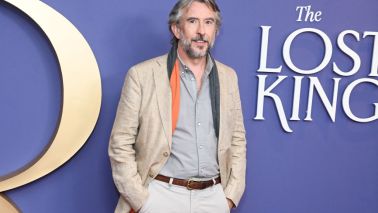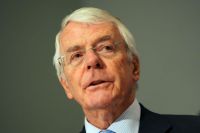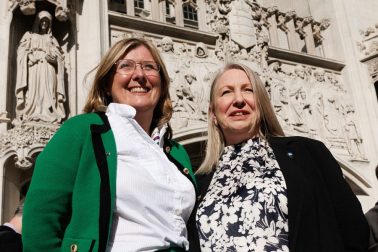One can understand — if not agree with — Gordon Brown’s idea that a deal with Libya was so worthwhile that the release of al Megrahi was a price worth paying. One can see, by the same unpleasant reasoning, why Mr Brown wished to avoid trying to get compensation out of Libya for the victims of its supply of explosives to the IRA. But two points occur. The first is that, as the plot unravels, the boldness of the Libyans shows that they have nothing to fear from us: they have us over a barrel (of oil?). When they first came to the table with us, they were frightened that they were next in George Bush’s war on terror. Now it is only we who look fearful. The other point is about Mr Brown’s way of making decisions. It is not necessarily a disgrace to find it hard to make up your mind. Margaret Thatcher was often surprisingly, exasperatingly indecisive when she weighed options in private. But once she had decided, and announced her decision, almost nothing would make her go back on it. This gave ministers and officials comfort, because they knew she would not drop them in it. Mr Brown seems to be almost exactly the opposite. He is said to be very demanding in private, insisting that he is right about what should happen, and dismissive of those who disagree. But once a decision is made, and controversy about it starts, his way of dealing with the problem is either to deny the decision, or to indicate that it was nothing to do with him, or to reverse the decision without admitting that this is what he is doing, or all three at once. In future years, Mr Brown’s decision-making style will surely head the ‘don’t’ section in leadership courses at business school and army staff college.
TV Licensing is now attacking me on two fronts. At home, where I am keeping my television licence but refusing to pay the fee unless the BBC sacks Jonathan Ross, I get red computerised warnings of approaching doom. In my flat in London, where I have no television, I get a letter telling me that ‘We have opened an investigation’. From my point of view, this is fine: the bureaucracy is performing as one would expect. But now a serious threat to my campaign comes from another source. This week, for the October issue of Standpoint magazine, I took part in a ‘dialogue’ with Sir Christopher Bland, the former chairman of the BBC. He has decided, he told me, to pay my fee, whether I like it or not, and so prevent a prosecution. Surely this despicable generosity is against the law?
We are all under moral pressure, because we are supposed to believe in politicians ‘facing the voters’, to agree that the party leaders should take part in a television debate in the next election. I wonder if it is such a brilliant idea. First of all, there are what might be called the ‘shape of the table’ problems. Why should the Liberal leader, Nick Clegg, get the same prominence as the Conservative and Labour leaders, since he will not be the next Prime Minister? Certainly, the big two will be reluctant to promote him in this way; equally, he will surely refuse a subordinate role. Then there is the question of the Nationalist leaders in Scotland and Wales. It is being suggested that extra debates be laid on so that they can take part too. And what about Northern Ireland? Then there will be endless argy-bargy about the selection of the questions. The upshot, for the viewer, is that attempts at fairness will produce programmes of suffocating boredom. But this is probably irrelevant anyway, because I do not believe that the debate will take place. This idea has been canvassed for British elections for more than 30 years. Each time, at least one leader, usually the Prime Minister of the day, has decided that it is against his interest to take part, and so has found a way of wriggling out. It is obviously strongly against Mr Brown’s interest to take part in this one, since he will cede the superiority of office and bear the brunt of most of the criticism. Besides, he is hopeless at thinking ‘live’. He says he will debate, but somehow or other (unless he is utterly desperate), when the day comes, he won’t.
No one ever praises bureaucracies, but I am stunned, not for the first time either, by the efficiency of the Inland Revenue, or HM Revenue & Customs, as Mr Brown renamed it. Less than a month ago, I put in my return for 2008-09, in which I was owed a small repayment. The cheque arrived before August was out. The flip side, of course, is that HMRC’s demands are equally pressing.
Last Saturday, in its regular slot of extracts from the paper on the same day in earlier years, the Guardian rather bravely reprinted the editorial it published in 1957 about the Wolfenden Report on homosexual offences and on prostitution. (I had forgotten that the report had paired these two subjects.) The Guardian explained that the report distinguished between a crime and a sin. Criminal acts, said Wolfenden, should only be those which do injury to others. So private, consenting homosexual acts, though sinful, should be legal, whereas soliciting should be punished. The Guardian did not wholly buy this argument: it pointed out that ‘two homosexuals, living together, might escape prosecution by committing no overt acts in public, and yet so flaunt their way of life in other respects as to be offensive or demoralising to others’. It also warned that the homosexual who is not liable to prosecution ‘loses a strong motive for seeking medical or other assistance in lessening his desires’, yet he ‘may need expert aid just as much as a prostitute does’. We live in a more ‘tolerant’ age, yet it is utterly inconceivable that anyone working for the Guardian would be permitted to express such views today.
In his excellent new book, The Making of the British Army, Allan Mallinson has inserted the following erratum slip: ‘The footnote on page 263 should read: “more than any other minor public school” (with apologies to Eton, Harrow, Winchester et al)’. The original footnote states ‘Major-General, later Field Marshal, White was educated at Bromsgrove, a school which, if it lacks any other distinction, can count five VCs won by Old Boys — more than any other school.’ So now poor Bromsgrove lacks even the distinction claimed in the footnote, and is publicly branded ‘minor’. It must regret it ever got into the book at all. (Eton, by the way, has 37 VCs, Harrow 19 and Winchester six.)
‘But if we fail,’ Winston Churchill famously warned in June 1940, ‘then the whole world …will sink into a new Dark Age made more sinister …by the lights of perverted science’. Was he thinking of the EU-inspired replacement of incandescent lightbulbs by CFLs?






Comments